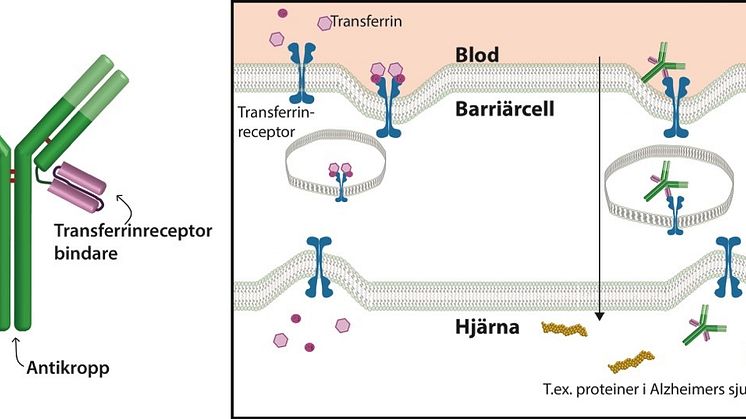
Press release -
New research study creates new opportunities for treating brain diseases
Immunotherapy has proven to be effective against many serious diseases. But to treat diseases in the brain, the antibodies must first get past the obstacle of the blood-brain barrier. In a new study, a research group at Uppsala University describes their development of a new antibody design that increases brain uptake of antibodies almost 100-fold.
Immunotherapy entails treatment with antibodies; it is the fastest growing field in pharmaceutical development. In recent years, immunotherapy has successfully been used to treat cancer and rheumatoid arthritis, and the results of clinical studies look very promising for several other diseases. Antibodies are unique in that they can be modified to strongly bind to almost any disease-causing protein. In other words, major potential exists for new antibody-based medicines.
The problem with immunotherapy for diseases affecting the brain is that the brain is protected by a very tight layer of cells, called the blood-brain barrier. The blood-brain barrier effectively prevents large molecules, such as antibodies, from passing from the bloodstream into the brain. It has therefore been difficult to use immunotherapy to treat Alzheimer’s and Parkinson’s disease, which affect the brain, as well as cancerous tumours in the brain.
It has been known for a long time that some large proteins are actively transported across the blood-brain barrier. These include a protein called transferrin, whose primary task is to bind to iron in the blood and then transport it to the brain. The research group behind this new study has taken advantage of this process and modified the antibodies they want to transport into the brain using components that bind to the transferrin receptor. Then, like a Trojan horse, the receptor transports antibodies into the brain. The number of modifications to and placement of the antibodies have proven to be important factors for making this process as effective as possible.
“We’ve placed them so that each antibody only binds with one modification at a time, despite being modified in two places. Our design thus doubles the chances of the antibody binding to the transferrin receptor compared with only one modification. We’ve successfully increased the amount of antibodies in the brain almost 100-fold, which is the largest uptake improvement that has ever been shown,” says Greta Hultqvist, researcher at the Department of Public Health and Caring Sciences at Uppsala University.
To try out the new format, researchers have used it on an antibody that binds to a protein involved in the course of Alzheimer’s disease. Without the modification, they could only detect very small quantities of antibody in the brain in a mouse model of Alzheimer’s disease, while they could detect high levels of the modified antibody in the same mice.
“From a long-term perspective, it’s likely that the new format can be used to effectively treat not only Alzheimer’s disease, but also other diseases affecting the brain,” says Dag Sehlin, researcher at the Department of Public Health and Caring Sciences at Uppsala University.
For more information please contact: Greta Hultqvist, email: greta.hultqvist@pubcare.uu.se, tel: + 46 (0)70-225 35 22
Greta Hultqvist, Stina Syvänen, Xiaotian T Fang, Lars Lannfelt & Dag Sehlin (2016) Bivalent Brain Shuttle Increases Antibody Uptake by Monovalent Binding to the Transferrin Receptor, Theranostics
Topics
Uppsala University -- quality, knowledge, and creativity since 1477
World-class research and outstanding education of global benefit to society, business, and culture.
Uppsala University is one of northern Europe's highest ranked academic institutions. www.uu.se

